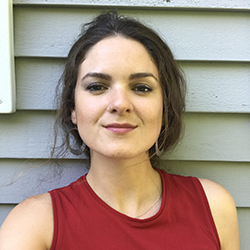HOW TO MAKE ME COME
Break the neck of the capitalist shrike, hollering and hollering in my belly. Behind her, a clogged and rusting pleasure barrel: body slam it. River-soak yet? Call my high school lover who pulled 1/3 of a split condom from me with his bare hand. No, wait, not him—call the gone sister who explained to my college love, full up on Franzia, how to go about it: three fingers and an instruction manual somewhere piled under past-due toll bills. The women always knew, no step-by-step. With your tongue, whistle back to the nuthatch singing outside, rhythmic, again, again, again, again, don’t, stop, there, the ice, on Ada, Hayden, melting, plates, shattering, into, each other. Tiny. Mountains. Rising. Plunge. Me. Daddy. I’ve never. Met an iceberg. I didn’t want / to swallow / whole, never / met a half- / woman I didn’t / want to cultivate / a garden with. You know the metaphor, right? The one where we both go yodeling through fields of mustard after? You the nun, I the bad, bad God? Baby, were you a flute player in a past life? I can feel every desperate rumble from the disappearing glaciers, shifting grief around in my anatomy—quickly, hunger darling. We don’t have much time.
TORSE GERBE (SHEAF TORSO), HANS (JEAN) ARP, 1958
Past the room where a merwoman
lies, pointy tits, all bronze & crowned
into spikes, past the courtyard
where the boy leaps from Pegasus
into February blue, past the dead
fountains and frozen pathways
and worked, warped stone, a small girl
in her blonde bob and pinked-up
Sunday pajamas says this one
to the grandmother willing her
to take a photo with Grant Wood
and his stocky yard, green & brown
everything, flat, but she says no, this one,
sidles up to this white curve of marble:
sculpture’s ass sparkling, whisper
tits, and no head just the essence
of a woman, coiled up, bottom-heavy,
propped on a square & sure podium
in the middle of a room where sun
slants away from her: take my picture.
The artist’s grief, says the plaque
on the wall, transformed the wife
he lost to a stove accident
into “an abstract image of beauty
and tranquility,” the unicorns or ladybugs
on the girl’s shirt crawling now
as she poses, the block beaming,
huge, colossal in its stillness, its finale,
as her grandmother coaxes the girl—
say I love you, say I love you, mommy—
to look into the mechanical eye.
Little me,
In Wisconsin, everyone waves to each other.
The stray cat in front of the co-op has gotten more love in the last twenty minutes than anyone can hope for in a year: someone’s just stooped their ancient body down to meet her with their rough hands behind her welcome ear; another has emptied a yogurt container to fill with water.
There is always someone waiting to shower you, little one.
In the driftless, every valley dodged the glacier’s flattening heft. Now, a farm cat swats at the blackbirds swooping down to greet it.
We’re never out of the woods: more woods, more wolves howling as you try to brave the outhouse. In the morning, all those trees remind you of their fellowship: eyes upon eyes of birches. I’m alone, said nobody ever without lying.
I know you are spooked, little me. I’ll hold you with my two warmest hands. I’ll take you to the bloodroot, imagine how its broken stem would light our finger pads orange, then let it be.
Someone who stayed in this cabin before us got themselves a deer: from the woodline, her ribs poke up like many white fingers.
I’m not saying, it’s all alright. I’m not saying, everything or forever.
I’m taking you to the Kickapoo: a hundred watery curves, a hundred hiding spots. Press your hips into the river’s. Dozens of wood anemones nodding back to you.
Put your feet in the goop. Watch the fly busy your belly hair.
I’ll wash the dried mud from your feet this evening on the back steps. Blue Dawn suds between every little piggy.
Take a load off, little me. Like the black cat at the store’s mechanical mouth, stretch your neck out.
Let the love come.

Zoë Fay-Stindt (she/Z/they) is a queer, bicontinental poet with roots in both the French and American south. Their work has been nominated for the Pushcart Prize, featured or forthcoming in places such as RHINO, Poet Lore, and Ninth Letter, and gathered into a chapbook, Bird Body, winner of Cordella Press’ inaugural Gwendolyn Brooks Poetry Prize. She lives in Ames, Iowa, where she is an MFA candidate at Iowa State University and community farm volunteer.

